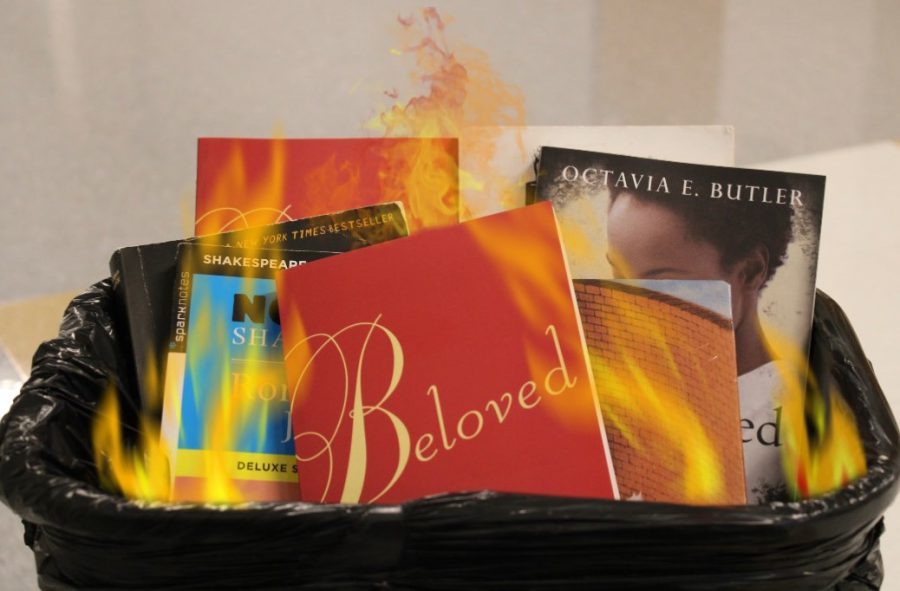Op-Ed: Push to censor books is a Virginia tradition
Politicians trying to censor book is a long standing Virginia tradition.
May 16, 2023
The trend of banning books in educational environments is proving increasingly popular. We’ve seen the opportunity to read and learn from more and more classic and popular books taken away from students. Sadly, this is not new.
A little background on book banning– it’s the most widespread form of censorship in the entire country, with children’s and young adult’s literature being the main targets. People advocating for banning certain books fear that their children will be swayed or influenced by their content. They regard the text as potentially dangerous.
While a parent’s concern for their child is reasonable, to go to the extent of banning a book so no other child can read and learn from it is preposterous.
In April 2022, Virginia passed a law that requires teachers to let parents know of sexually explicit content in books that their children will be reading in their class.
Lin Rudder, an AP English and creative writing teacher at Lightridge, gave her point of view on the passing of this “unnecessary” bill.
“Before the policy was even enacted we would notify parents if we considered something sexually explicit,” said Rudder. “We would give them a general background of it. Alongside this, we have been very transparent with parents, we have always had parents and students let us know that if they needed an alternate (book), to let us know and we would be happy to provide one.”
Rudder expressed concerns over the ethics of the bill, because what the state government defines as sexually explicit differs from what a trained English teacher would define as sexually explicit content.
The metrics that they’ve set are difficult to understand and if you’re too broad with the definition almost everything will become sexually explicit.
“When you have a lot of people who aren’t teachers trying to decide what should be happening in English classrooms. They create policies that are not better than what was already in place,” Rudder explained.
What we’re noticing is that students and parents are ignoring the content of a book until it gets to the sexually explicit part of the text. Parents are notifying teachers in the middle of a unit to complain about the explicit content of the book when they are already halfway through and teachers can’t do anything about it.
“When parents tell me that they aren’t comfortable with their child, who is very often an adult at this point (18 years old), it makes me feel like they aren’t trusting my judgment and ability to guide them through that material,” said Rudder.
The blatant arguing and judgment targeted towards trained English teachers on a matter that they of all people would have the most knowledge about, is nothing if not startling and disrespectful.
Rudder demonstrates the measures she takes to make her students comfortable when reading novels with explicit material, such as marking chapters that contain sexually explicit content so a student can skip it if they need to, that were already actions being taken before the passing of the bill.
An occurring pattern that is present in the effort to ban books is that parents have again and again expressed their dislike of books with gay characters or books written by black authors that are suggested to be taught in classrooms.
The overwhelming bias that is apparent in most of these decisions is baffling. How is prohibiting the opportunity to read and analyze a work of literature from every single student deemed fair just because a handful of parents don’t want their own child reading its content?
“If you look at books that are being challenged, you’ll quickly realize that they aren’t challenging Shakespeare. They aren’t challenging white authors,” said Rudder.
The state legislature’s history with book banning and challenging teachers is hardly new. The last major conflict came in 2016.
Jessica Berg, an English teacher at Rock Ridge High School in Loudoun County, and longtime warrior against book banning, expressed her frustration towards the legislature’s demeaning of teachers and criticizing how they choose to run their classrooms through a number of heated emails to Virginia State Senator Richard Black back in April 2016.
Jessica Berg has been teaching English for twelve years and is entering into her fifth year of teaching Gender and Women’s Studies, which she fought to introduce to Loudoun County schools.
“Through my dedication to education and active involvement in the fight for gender equality, I have been actively pursuing positions beyond the classroom with which my skills would be applicable,” said Berg.
The fervid emails and Black’s response in which he chastised Mrs. Berg ended up getting national attention. With the lively email exchange appearing locally in “The Loudoun Times Mirror” and nationally in “The Washington Post” and the website “Jezebel.”
“I wrote to legislatures imploring them to trust the professionalism and expertise of teachers, how we teach, what we teach, and that the care and wellbeing of our students is always at the center of what we do,” said Berg.
Berg wrote a number of emails to state representative Richard Black, who was attempting to pass a bill in the Virginia Legislature that would lead to the censorship of certain novels to be taught in schools.
This bill was largely based on the merits of the Pulitzer Prize winning novel, “Beloved,” written by Toni Morrison, a Nobel peace prize winner for literature.
“Beloved” examines the destructive legacy of slavery as it chronicles the life of a Black woman named Sethe, from her pre-Civil War days as a slave in Kentucky to her time in Cincinnati, Ohio, in 1873. The novel has and continues to stir controversy across America.
Black described the book as “moral sewage.”
The novel has sparked a number of vital discussions among students in multiple AP English classes, and students are expected to handle these discussions and its material like mature adults.
“Not being able to discuss this novel, and having students understand the horrors present in our nation’s history, is doing a real disservice to current and future generations,” Berg said, regarding the attack on the esteemed novel. “As teachers we guide them through these novels in a mature manner in an academic setting so that we can discuss them in a fitting manner because that is our job, not yours.”
Being an experienced teacher, Berg had to explain to Black that he has no right to pass any judgment on how teachers teach.
“English class is where we take topics and issues that arise for students, and pretty much every human being for that matter, on a daily basis,” said Berg. “We discuss them in an academic manner analyzing them through the character’s experiences, and through the different lenses of literary criticism.”
A trend I, and Berg, have noticed in those who want to ban books, is that these people aren’t reading the entirety of the novel. How can they pass any sort of judgment if they have only read excerpts of a novel that won the Pulitzer Prize for Fiction? How can we possibly have a reasonable discussion about the material of the book if you don’t read the book?
Richard Black’s response to Berg was immature, rude, and severely lacking reason.
“I was surprised by your personal advocacy of the book “Beloved.” That book is so vile – – so profoundly filthy – – that when a Senator rose on the Senate Floor and began reading a single passage, several other Senators leapt to their feet to interrupt the reading,” Black said.
He went on to call the material of the novel “disgusting” and “vile,” further emphasizing his ignorance towards the acclaimed novel.
“I supported this bill and will continue to work for a parent’s right to know when their child is going to be exposed to such vile materials by their teacher, “said Black.
His condemnation of teachers was startling and frankly hard to swallow.
Black, and other members of the legislature, have entertained and encouraged the concept of demonizing teachers for simply doing their job.
It is a teacher’s job to introduce novels to a class and approach them with maturity and academic probity to their students. It is my personal belief that we need to stop trying to control classrooms that aren’t ours and let teachers do their job. It isn’t our place to judge and condemn teachers for reading and analyzing books in an educational setting when that is what they’re trained to do.
Part of Berg’s concern was the stifling of voices, stories and ideas that these books provide to growing students so they don’t end up ignorant to these concepts. Berg goes on to say that you cannot “censor life.”
“Great literature kills ignorance and brings the world closer one page at a time. Anyone deeming great literature “poisonous” does not understand literature, so leave it to the teachers that teach this on a daily basis, that understand the importance of it, and know how to convey these ideals to a classroom full of students.”





